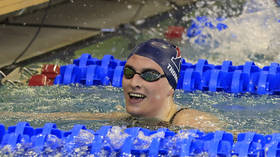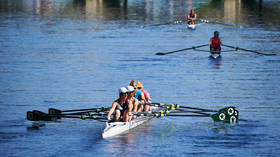
The world governing body for swimming banned trans athletes from competing as women last year

Transgender swimmer Lia Thomas’ NCAA championship partially inspired World Aquatics’ gender inclusion policy, adopted in 2022 © Getty Images / Justin Casterline
World Aquatics, the governing body for swimming, has suspended a planned open competition category for transgender athletes at the 2023 Swimming World Cup in Berlin this week after no entries were received, the group revealed in a press release on Tuesday.
“Following the close of registration for the Open Category competitions at the World Aquatics Swimming World Cup – Berlin 2023 meet scheduled for 6-8 October, World Aquatics can confirm that no entries have been received for the Open Category events,” the sports body formerly known as FINA stated.
World Aquatics banned transgender swimmers who had transitioned after the age of 12 from competing in the elite women’s category last year after a growing body of research and the rapid dominance of the competitive field by trans athletes who began competing as women after puberty appeared to confirm an unfair advantage for such swimmers, a subject which remains controversial.

Read more
The governing body had announced the open category in August, offering trans swimmers of “all sex and gender identities” the opportunity to race in 50- and 100-meter contests “across all strokes” as a trial competition, describing the pilot project as one with “emphasis on gaining further experience for future development and celebrating diversity.”
The possibility of competing in an open category will remain available to trans athletes in the future, World Aquatics appeared to confirm in its statement on Tuesday.
“Even if there is no current demand at the elite level, the working group is planning to look at the possibility of including open category races at Masters events in the future,” it said.
A growing number of international sporting bodies have laid down rules prohibiting athletes born male from competing as women in the past year. In July, the International Cycling Union barred cyclists who underwent male puberty from women’s events, citing the unfair advantage conferred by their elevated testosterone levels while offering them a place in a newly-renamed Men/Open class. The World Athletics Council enacted a similar rule in March, prohibiting athletes who had undergone male puberty from competing in women’s track and field events regardless of their current hormone levels.




